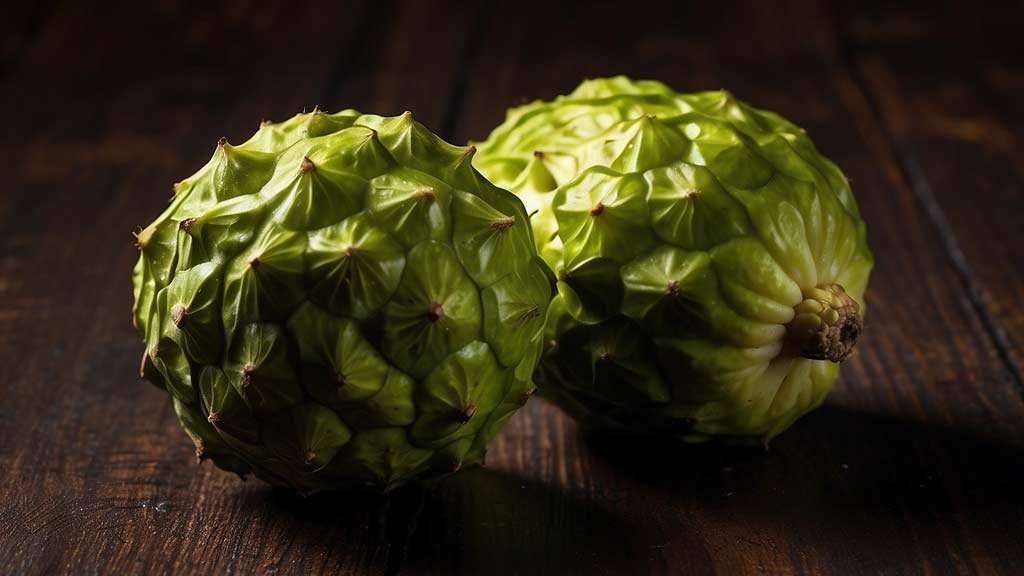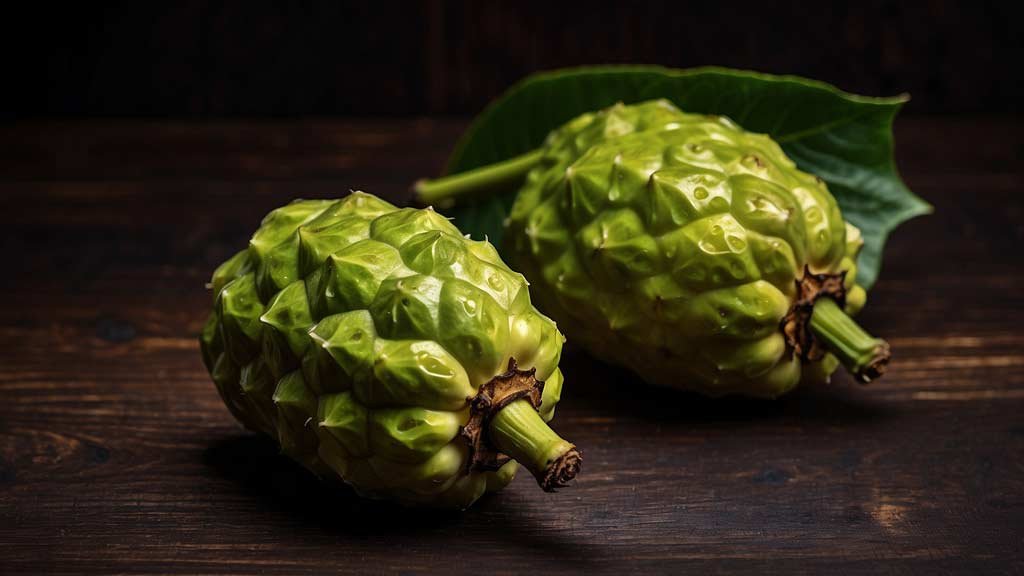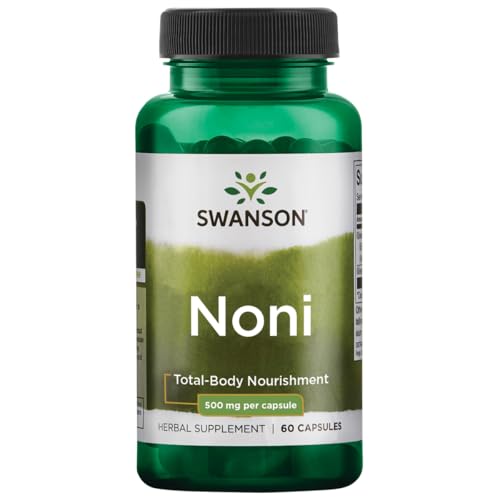A Fruit With a Story
Noni (Morinda citrifolia) isn’t just another exotic superfruit that popped up in the wellness aisles one day. For centuries, Polynesian communities relied on it as a cornerstone of traditional medicine. They didn’t just eat the fruit for nourishment; they used the leaves, roots, bark, and even the seeds. If you talk to older families in Samoa, Tahiti, or Hawaii, you’ll hear how noni juice was given for fevers, infections, and fatigue. Some still say it was the “canoe plant,” carried across vast oceans because it was too valuable to leave behind.
The smell? Let’s be honest—raw noni fruit has been compared to rancid cheese or overripe blue Stilton. The taste is equally challenging: bitter, sharp, sometimes downright unpleasant. Yet people drank it willingly, not for pleasure but for survival. That says something.
Table of Contents
What’s Inside Noni
The power of noni lies in its chemistry. Researchers have identified a complex mix of compounds:
- Polysaccharides that stimulate immune activity
- Scopoletin, linked to blood pressure balance
- Iridoids, powerful antioxidants that fight oxidative stress
- Vitamin C and trace minerals like potassium and magnesium
- Anthraquinones, known for antimicrobial effects
This cocktail gives noni its reputation as both a protector and restorer of health. Modern science is catching up with what Polynesians already knew—that noni strengthens resilience when the body feels under siege.
Noni and Immunity
When people talk about noni today, the conversation almost always circles back to immunity. There’s research showing that noni polysaccharides enhance the activity of macrophages, the immune cells that swallow and destroy pathogens. Imagine your body’s inner janitors suddenly working overtime, clearing debris and invaders before they can cause harm.
It’s not a magic shield, but studies suggest that regular noni juice intake may help shorten the duration of colds, improve resistance to infections, and support recovery. A friend of mine swears by a small shot every morning through winter. She hates the taste, plugs her nose, but hasn’t missed a week of work in years. Anecdotal? Sure. But you hear stories like this often with noni.
Energy, Endurance, and Vitality
Beyond immunity, noni carries a reputation for energy. In Polynesia, warriors and navigators took it before long journeys. They believed it strengthened the body against exhaustion. Today, athletes in Hawaii and Japan still use noni juice as a natural performance aid.
A few small clinical trials suggest noni may reduce fatigue and improve physical endurance, possibly due to its effect on mitochondrial function and antioxidant activity. It’s as if noni helps cells use oxygen more efficiently. That matters not just for athletes but for anyone dragging through the day, eyes half-open by mid-afternoon.
Digestive Support and Gut Health
Noni has long been a go-to for stomach troubles. Traditional healers used it for indigestion, constipation, and even parasitic infections. The reason could be the anthraquinones, which act as mild laxatives, and the fruit’s prebiotic fibers, which nourish gut bacteria.
If you’ve ever tried fresh noni juice after a heavy meal, you’ll know what I mean—it “moves things along.” It’s not subtle, but it works. For people dealing with sluggish digestion, this was a natural fix long before modern laxatives.
Pain Relief and Anti-Inflammatory Effects
One of the most fascinating aspects of noni is its role in pain relief. In Polynesia, poultices of noni leaves were applied to bruises, sprains, and joint pain. Modern research points to compounds in the fruit and leaves that modulate inflammation and act on pain pathways.
Some scientists have compared its analgesic effect to that of certain over-the-counter painkillers, though gentler. For people with arthritis or chronic aches, drinking noni or applying leaf extracts may bring measurable relief.
Skin and Wound Healing
Skin is another area where noni shines. The leaves were often warmed and laid on cuts, infections, and even boils. The fruit pulp, mashed into a poultice, could be used on wounds. Antimicrobial properties likely helped prevent infection, while antioxidants sped up healing.
In modern cosmetics, you’ll now find noni extract in creams for anti-aging, acne, and sun damage. There’s a certain irony in how a fruit once applied to oozing sores is now bottled in luxury skincare lines. But the healing logic is the same.
A Few Words on Safety
Noni is generally safe when consumed as juice or extract in moderate amounts. Still, there are cautions. Some studies suggest that excessive intake—especially of concentrated noni juice—may stress the liver. This isn’t common, but it’s worth noting if you already have liver conditions. Pregnant women traditionally avoided noni, and modern guidance often recommends the same out of caution.
As always with herbal medicine, moderation and respect for the plant are key. You don’t chug a liter of noni hoping for superhuman powers. A small daily serving, often 30–60 milliliters of juice, is the traditional way.

How to Use Noni Today
If you want to bring noni into your life, you’ve got options:
- Fresh fruit: Rare outside tropical regions, but if you can find it, ferment or juice it. Be ready for the smell.
- Noni juice: The most common form, usually sold pasteurized. Look for pure juice without added sugar.
- Powdered noni: Dried and ground fruit, easy to add to smoothies or capsules.
- Topical products: Lotions or oils with noni extract for skin health.
One tip: don’t expect it to taste like mango or acai. If you want flavor, mix it with grape, pineapple, or blueberry juice. If you’re a purist, gulp it straight and chase with water.
Noni in a Modern Context
Here’s where it gets tricky. Noni has been marketed aggressively in the West, sometimes with wild claims—“cures cancer,” “reverses aging,” “melts fat.” Those exaggerations tarnish its reputation. The truth is simpler but no less powerful: noni supports the body in multiple ways, particularly immunity, energy, and resilience.
I once met a Hawaiian herbalist who put it bluntly: “Noni’s not magic, but it keeps you steady.” That feels like the most honest description. It’s a stabilizer, a plant that helps your body ride the storms without capsizing.
Best Selling Noni Supplements
A Fruit Worth Respect
Noni is not for everyone, and it’s not the most pleasant fruit to taste. But its cultural weight, historical use, and growing scientific backing make it one of the most interesting medicinal plants on Earth. If you’re curious enough to try it, approach it the way Polynesian navigators did—patiently, respectfully, with an open mind about what resilience means.
When you drink that bitter juice, you’re not just swallowing nutrients. You’re sharing in a survival story that spans oceans and centuries.
Here are the meta title, meta description, and fully formatted sources in APA style:
Article Sources
At AncientHerbsWisdom, our content relies on reputable sources, including peer-reviewed studies, to substantiate the information presented in our articles. Our primary objective is to ensure our content is thoroughly fact-checked, maintaining a commitment to accuracy, reliability, and trustworthiness.
- Abou Assi, R., Keating, G. A., Schroeder, R., et al. (2017). Morinda citrifolia (noni): A comprehensive review on its traditional uses, phytochemistry, pharmacology, safety, and clinical efficacy. Journal of Ethnopharmacology, 210, 309–327. https://doi.org/10.1016/j.jep.2017.07.021
- Choi, S.-I., La, I.-J., Han, X., Men, X., Lee, S.-J., Oh, G., Kwon, H.-Y., Kim, Y.-D., Seong, G.-S., Kim, S.-H., & Lee, O.-H. (2022). Immunomodulatory effect of polysaccharide from fermented Morinda citrifolia L. (noni) on RAW 264.7 macrophage and Balb/c mice. Foods, 11(13), 1925. https://doi.org/10.3390/foods11131925
- Hirazumi, A., & Furusawa, E. (1999). An immunomodulatory polysaccharide-rich substance from noni (Morinda citrifolia) fruit juice shows anti-tumor activity by activating host immune system in mice. International Journal of Immunopharmacology, 21(8), 537-549. https://pubmed.ncbi.nlm.nih.gov/10441776/
- Kim, H., Lee, H., Jung, C., Lee, J., & Son, K. (2022). NK cell-mediated immunostimulatory effects of ethanol extract of noni (Morinda citrifolia) fruit in healthy mice. BMC Complementary Medicine and Therapies, 22, Article 234. https://doi.org/10.1186/s12906-022-03700-3
- U.S. National Center for Complementary and Integrative Health (NCCIH). (n.d.). Noni: Usefulness and Safety. NCCIH. https://www.nccih.nih.gov/health/noni
- Wang, M.-Y., Hurn, J., Peng, L., Nowicki, D., & Anderson, G. (2011). A multigeneration reproductive and developmental safety evaluation of authentic Morinda citrifolia (noni) juice. Journal of Toxicological Sciences, 36(1), 81-100. https://doi.org/10.2131/jts.36.1_81
- West, B. J., Jensen, C. J., & Su, C. X. (2008). Prenatal toxicity test of Morinda citrifolia (noni) fruit. Journal of Toxicological Sciences, 33(5), 581-585. https://pubmed.ncbi.nlm.nih.gov/19043286/
- WebMD. (n.d.). Noni: Uses, Side Effects, and More. WebMD. https://www.webmd.com/vitamins/ai/ingredientmono-758/noni
- Plant-Based Iron, Iodine, and Mineral Support Using Herbs - January 23, 2026
- Vegan Alternatives to Beeswax and Honey in Herbal Preparations - January 22, 2026
- Alcohol Free Herbal Extracts, Glycerites, Vinegar Extracts, and Teas Explained - January 22, 2026











